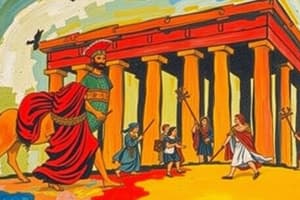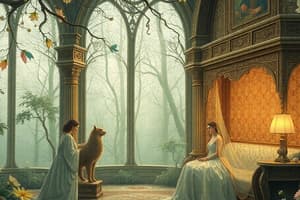Podcast
Questions and Answers
Why did Plato banish the poets from his ideal commonwealth?
Why did Plato banish the poets from his ideal commonwealth?
Plato banished the poets from his ideal commonwealth because he found poetry to be wanting and a danger to the ideal system he was preaching for.
What were Plato's views on poetry and literature?
What were Plato's views on poetry and literature?
Plato criticized poetry and literature, considering them to be a danger to his ideal state and a deceptive force that copies life, which is merely an imperfect reflection of the ideal.
How did Plato view art and its impact on man's morals?
How did Plato view art and its impact on man's morals?
Plato considered art to be dangerous to man's morals. He believed that Athens needed discipline and reason, and that fiction seemed suicidal for the Greeks.
What did Plato exiles from his Republic, and why?
What did Plato exiles from his Republic, and why?
What are the elements of a true theory of poetry according to Plato?
What are the elements of a true theory of poetry according to Plato?
Plato believed that poetry and literature could help with the new educational system of his ideal state.
Plato believed that poetry and literature could help with the new educational system of his ideal state.
Plato considered art to be dangerous to man's morals and believed that Athens needed discipline and reason.
Plato considered art to be dangerous to man's morals and believed that Athens needed discipline and reason.
Plato's views on poetry and literature were appreciated and embraced by the Greeks.
Plato's views on poetry and literature were appreciated and embraced by the Greeks.
Plato's dialogues, including Ion, Meno, Phaedrus, and The Republic, did not concentrate on poetic or literary inspiration, imitation, and condemnation of poetry.
Plato's dialogues, including Ion, Meno, Phaedrus, and The Republic, did not concentrate on poetic or literary inspiration, imitation, and condemnation of poetry.
According to Plato, the poet is inspired, and the elements of a true theory of poetry are contained in the notion that the poet is inspired.
According to Plato, the poet is inspired, and the elements of a true theory of poetry are contained in the notion that the poet is inspired.
Flashcards are hidden until you start studying
Study Notes
Plato's Views on Poetry and Literature
- Poets were banished from Plato's ideal commonwealth due to concerns over their influence on morality and truth.
- Poetry was seen as an imitation of reality, leading to potential deception and distortion of the truth.
- Plato believed that poetry could undermine reason and discipline, which were essential for a well-ordered society.
Impact of Art on Morality
- Art is viewed as dangerous to man's morals, as it can incite irrational emotions and disrupt social harmony.
- Plato advocated for a society grounded in reason and discipline, rather than emotional appeal found in poetry and art.
Elements of Plato's Theory of Poetry
- Acknowledged that poets are inspired, suggesting that their creations come from a divine source rather than personal skill.
- True theory of poetry must consider the nature of inspiration and the role of the poet as a medium rather than a creator.
Educational System in Plato's Ideal State
- Poetry and literature were seen as valuable tools for the new educational system if aligned with moral and rational values.
- Emphasized the importance of filtering artistic expression to ensure alignment with the state’s ethical standards.
Reception of Plato's Views
- His ideas on poetry and literature were appreciated by the Greeks, reflecting broader philosophical debates of the time.
- Dialogues such as Ion, Meno, Phaedrus, and The Republic explore themes of inspiration, imitation, and the societal role of poets without romanticizing their influence.
Studying That Suits You
Use AI to generate personalized quizzes and flashcards to suit your learning preferences.




